- Home
- Andy McNab
Seven Troop Page 2
Seven Troop Read online
Page 2
'What was he doing with an AK anyway?'
He shrugged. Guys often had the odd weapon stashed away as a souvenir. Our first task if a mate got killed was to clear up before his family was allowed into his house. One had had enough PE4, rifles and ammunition in his loft to start the next world war. The MoD didn't have to worry about budget cuts: they could have popped round to his place.
There were already mutterings in the media about Gulf War syndrome, but however horrendous GWS was for the sufferers, it was a world away from post traumatic stress disorder (PTSD). It was a medical issue rather than a mental-health one.
Three guys who served with Shanks in the Gulf, two of them doctors, had already committed suicide – apparently because of the strain of their military experiences. The sight of casualties carried in with limbs missing, horrifically scarred, most of them young men in their prime, must have taken its toll.
After he returned from the Gulf, Shanks had difficulty concentrating and remembering things, and suffered increasingly severe mood swings, irritability and depression – which were consistent with symptoms experienced by others who returned from the Gulf. I wondered if he'd been suffering from PTSD when he'd shot Vicky Fletcher.
From a professional soldier's point of view, two erratic bursts were a sign of a disturbed man. If he'd been in control, he would just have put two rounds into her head.
'That's us two off the hook, Father Frank. We're Gulf War-free.' Nish took a drag on his cigarette. 'Dunno about McNab, though. Reckon he's a walking time-bomb.'
GWS was about the only thing I knew I wouldn't be suffering from later in life. In the SAS we had some control over our lives. The drugs did turn up, but unlike the rest of the army we weren't ordered to take them. We binned ours, working on the principle that if we were attacked with a blood or nerve agent that could kill in seconds, a daily handful of capsules wasn't going to make much difference.
Frank was still brooding. 'Maybe he's just another lad who lost his head. There are enough of us.'
I put a hand on Nish's shoulder and poked a finger at Frank. 'You're the vicar, mate – you're supposed to have the answers. PTSD? Or maybe he really is just mad, like this fucker.'
Nish burst out laughing. 'I'm not mad – not this week, anyway.' He flicked his cigarette into the stream and immediately lit another. 'I wonder if Shanksy wishes he'd saved a couple of rounds for himself. I would have.'
Frank was in Sunday-sermon mode. 'When taking a life has been sanctioned by the state, that's one thing.' He paused to allow the weight of his statement to sink in. It didn't. 'But taking a life out of anger, well, that's quite another.'
Nish turned and grabbed him in a huge bear hug. He beamed from ear to ear. 'Awww, Frank still thinks we're shining knights, agents of wrath to bring God's punishment on the evil-doer. Not just mad fuckers who get pissed off and kill people . . .'
Frank had had years of us taking the piss out of his beliefs. It was like water off a duck's back. He kept on-message. 'Is any of us less guilty than Tommy? I've seen enough killers to know one when I see one.'
I grinned at the pair of them. 'You're both as deranged as each other. Nish, you have regular conversations with your fridge . . .'
Nish nodded.
'. . . and you, Frank, you've got God telling you what to do, haven't you?'
There was a long pause. 'I thought I did, mate. I thought I did.'
Nish and I exchanged a look, and then he followed Frank back to the party.
I watched them fade into the darkness. One of those loonies kept dreaming about freefalling from the edge of space. The other believed there was an old man with a white beard who lived up there. I couldn't help wondering whether the jungle punch we'd all drunk fourteen years ago had had some mad potion in it, and I was next on the list.
For all that, they were two of the best friends a person could ever hope for. We'd been through a lot together, the three of us and the handful of others from Seven Troop. We had killed and some of us had been killed, and the outcome was a closeness that outsiders might find hard to understand and impossible to share. We scoffed at the notion of brotherhood, but that's what we were: brothers in arms. My ten years in Seven Troop were the most awesome of my life. Since I'd left in 1993 there hadn't been a day when I didn't thank my lucky stars that I'd had the chance to be associated with the most highly skilled and inspirational bunch of guys I've ever come across.
The trust between Frank, Nish, me and the others had been total. It had had to be. Would we have died for each other? Yes. But brotherhood forged under extreme danger comes at a price. Some had already gone mad; others were well on the way.
If only I'd known then that Tommy Shanks murdering his ex-girlfriend and Nish trying to kill his a year earlier wasn't going to be the end of the story. Could I have prevented what happened next? Probably not. But that couldn't stop me lying awake asking myself the same questions over and over.
I remembered a mate from A Squadron coming up against the RAF shrink after my release from Baghdad's Abu Ghraib prison at the end of the '91 Gulf War. Mugger had been in overall charge of the SAS recovery mission: he went into Riyadh to organize a few videos for our entertainment while the B Squadron sergeant-major turned up with a hospital trolley loaded with beer. We were smuggled out of the ward and down to the library, where we set about getting blitzed.
Dr Gordon Turnbull had arrived in Cyprus to oversee the recuperative phase. 'What have you got there?' he asked Mugger, when he spotted his shopping bags.
'Videos for the lads.'
'Mind if I have a look?'
Turnbull nearly had a heart-attack. Mugger had bought us Terminator, Driller Killer and Nightmare on Elm Street. 'You can't do this! Those men are all traumatized!'
'Traumatized?' Mugger laughed. 'They were all fucking barking to start with.'
What had sent Shanks, Nish and others to the dark side?
What was it about the landscape we'd crossed and the things we'd had to do that had brought them to this point? Why had I been spared?
And perhaps the biggest question of all: should I have seen it coming? Were the clues there all along?
I didn't often look back. In our line of work, reflection isn't healthy.
But if I was going to find the answers, maybe it was time to revisit the journeys taken by this united but disparate band of men.
I leant back on the rail. A lot of water had flowed under the bridge since 1984.
1
MALAYSIA
July 1984
Two things have stuck in my mind from my first day with B Squadron. First, what a complete and utter knobber I felt in the jungle in all my shiny, squeaky-clean new kit. And second, how loud my ears still rang with the advice I'd been given in Hereford the week before.
'Never forget, it's harder to keep than it was to get,' the colonel had said to the eight new boys as he tossed each of us a sand-coloured beret like they were frisbees.
In the corridor afterwards the RSM (regimental sergeant-major) had added, 'You might have spent six months doing the toughest selection course known to man, but now it's right back to square one. Because, lads, you know jack shit.' He eyed us carefully as he took a long drag on his roll-up. 'When you get to your squadron, make sure you wind your neck in. Shut up, look, and listen. Pick out a role model. See what he does and why he does it. Now, the four of you joining B Squadron, go and draw your kit – you're going to Malaysia. And one final thing.' He took another drag and looked at each of us in turn. 'Good luck. You'll need it.'
B Squadron was famous for storming the Iranian Embassy in 1980. The live TV footage was the very first time I had seen the Regiment in action. It was that footage, and the fact that the Green Jackets had missed out on the Falklands conflict two years later, that made me want to take Selection. After all, I'd joined the army to fight, and they were always in the thick of it.
The SAS consisted of four Sabre Squadrons: A, B, D and G. They, in turn, were divided into four troops, e
ach with a specialist infiltration skill. Air Troop infiltrated enemy territory by parachute. Mobility Troop got in by any overland means. Boat Troop attacked from the water. Mountain Troop went by foot, scrambling over any big lumps of rock that happened to be in the way. Each troop was numbered so you knew which squadron it came from. In B Squadron, Boat Troop was 6, Air Troop was 7, Mobility 8, and Mountain 9.
None of us knew which troop we were headed for. We were just told we'd be allocated once we got in-country.
Two guys came to collect us from a muddy, rutted road-head close to the northern border with Thailand after our day's drive from Kuala Lumpur. One was a Maori, the other a gingernut, with hair thick enough to be made into a rug. 'I'm Al,' he said. 'Ready?'
We shouldered our Bergens and followed them into the twilight world of the primary rainforest. Huge hardwood tree-trunks fanned out into buttresses on the ground. Way up at sky level, the canopy was bushy and tight; hardly any light reached the leaf litter under our boots.
Gingernut didn't look the happiest man on the planet, which I thought was strange: he should have liked being out of the sun. His pale skin seemed even paler under the canopy. He was about six foot tall, and lean, almost bony. He had the look and bearing of an officer, and he even sounded like one, on the rare occasions he opened his mouth. He talked as if the words were being dragged out of him with pincers. I had the feeling I'd seen him somewhere before, but I couldn't place him.
'We have a twenty-minute tab. Been here a while. Jungle training, mostly. And as a deterrent against insurgents.'
The Maori said even less than Al, if that was possible. Lots of New Zealanders and Australians joined the Regiment, but this guy wore different jungle camouflage from Al and the rest of us. The Kiwis had an infantry battalion based in Singapore. Maybe he was with them, or New Zealand SAS. No matter – if they weren't telling, I wasn't asking.
The advantage of thick canopy is that at least the undergrowth is sparse and easy to move through. But when the canopy thins and light gets through, you'd be lucky to cover a kilometre in four hours. You're never alone in the jungle. We shared it with red ants, leeches, scorpions, massive ticks that buried themselves in your skin, and every make and model of snake was queuing up to take a bite out of you. And then, of course, there was scrub typhus, jaundice, dysentery, rainforest ulcers, prickly heat, foot rot and ring worm. But this is still the best environment to fight in. It provides cover and water, and you never get cold or hungry.
Al smacked his neck and a mosquito died. 'Poxy malaria merchant.'
It was stiflingly hot and humid. My jungle greens were already drenched with sweat. What had I expected? It's called rainforest because of the rain. The moisture can't escape the dense canopy, so it's wet, hot and very sticky, twenty-four/ seven.
Everything we had, we carried with us. We all had two sets of kit – dry kit to sleep in, and wet kit. First thing we did every morning was put our wet kit back on.
I didn't have great memories of the jungle phase of Selection. Everything was about keeping that dry kit dry. If it got wet, you'd never get it dry. Mine was double-wrapped in plastic Bergen liners, and then in another for luck.
We followed a narrow, muddy foot-track to a commune of A-frame pole-beds. You could tell the guys had been there a while. Some A-frames had sprung extensions; others had duckboards made of branches to keep them above the mud. Figure-11 targets, the standard army target of a man charging, stuck to a hardboard backing, had been cut and nailed to logs to make tables and chairs, and there were angled sit-up boards for a makeshift gym. Here and there, two or more A-frames had been joined together with poncho shelter sheets.
A radio hissed continuously. Food bubbled in mess tins or large cooking-pot-shaped grenade tins resting on one or more little hexamine stoves.
There was a strong smell of cigarette smoke. Nobody wore rank. Everybody had beards and long greasy hair. They lay around outside A-frames reading books, or squatted over hexis brewing up. It was like I'd walked onto the set of Platoon.
'This is Squadron HQ. Just sit and wait out.'
Al and the Kiwi disappeared between the A-frames.
Everyone, including me, had two morphine auto jets hanging from their neck by para-cord, along with a watch and sometimes a little button compass. If anyone left their basha (shelter) area they had their webbing and weapon with them all the time – and their gollock. You went nowhere without one tied around your waist. It wasn't part of your belt kit, it was part of your body. It was your most essential item under the canopy – it cut down and dug out food, it built you traps and shelter, and gave you a means of protecting yourself.
The air filled with buzzing as we sat in sweltering 90 per cent humidity. The entire insect population had heard there was fresh blood in town. Tastiest of the bunch, apparently, was the Green Jacket. I rubbed more mozzie rep (repellent) on my face and hands, but it made no difference. The little fuckers still hovered and swooped and were biting me to bits.
2
A guy stood up from his hexi stove with a cigarette burning so low between his lips it was in danger of setting fire to his beard. 'All right, lads – want a brew?'
He passed round one of the black plastic pint-and-a-half mugs that normally went over the water bottle on our belt kit. It steamed with hot, sweet ration-pack tea. We took a swig each and stood there, the sweat gluing our clothes to our backs.
There was a whirlwind between the ponchos over to our left and an educated voice delivering a series of instructions with the staccato rapidity of a GPMG (general purpose machine gun). 'I want this, this, this and this . . .' He approached our little group and clapped his hands. 'I'm Graham.' Everybody seemed to be on first-name terms round here. 'I need one of you for each troop.' He looked us up and down. 'You look like a diver – Six Troop.'
A Royal Engineer, a keen climber, volunteered for Mountain Troop.
'Right, that's Nine Troop sorted, then.'
I breathed a sigh of relief. Anything but Mountain Troop. Graham pointed to the guy next to me. 'Eight Troop. Mobility.' Then he nodded in my direction. 'Got your shades?'
I smiled back and nodded, not knowing what the fuck he was on about.
'Good. Seven Troop.'
Back in whirlwind mode, he disappeared beneath the shelter sheets once more.
'That's Boss L,' the guy who'd offered us the brew said. 'The OC.'
The Squadron Officer Commanding was always a major. Troop commanders were captains. He was from a Highland regiment and a champion skier. Born for the jungle, obviously.
It wasn't long before our new companions came to claim us. 'What troop you going to?' the first one asked.
'Air Troop.'
'The Ice Cream Boys!'
Sunglasses? Ice cream? I still didn't have a clue what they were on about, and before I could ask, a giant of a man bore down on me, a good six foot three tall and four foot wide. His hands were so big his M16 looked like a toy.
'Who's for Air Troop?'
I stood up. 'That's me.'
'I'm Tiny.' A half-smile crept out from under his beard. 'Get your Bergen.'
Bizarrely for such a big guy, he bounced on the balls of his feet. He had long curly hair but was balding on top. He looked like some kind of spring-loaded hippie monk.
I followed him to the troop location, trying to get my new boots even muddier.
'What's your name?'
Thunder boomed way above the canopy.
'Andy. Andy McNab.'
'What battalion you from?'
'Two.'
'I'm Two Para too. D'you know—?'
'No, mate, Two RGJ – I'm a Green Jacket.'

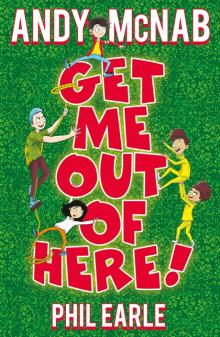 Get Me Out of Here!
Get Me Out of Here!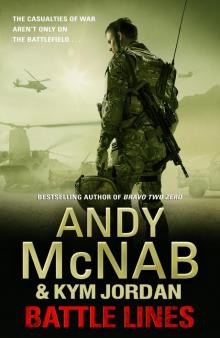 Battle Lines
Battle Lines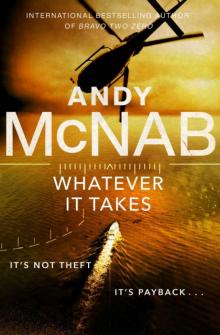 Whatever It Takes
Whatever It Takes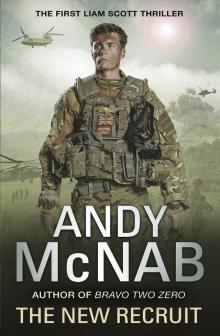 The New Recruit
The New Recruit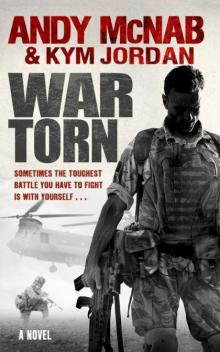 War Torn
War Torn Brute Force
Brute Force Crossfire
Crossfire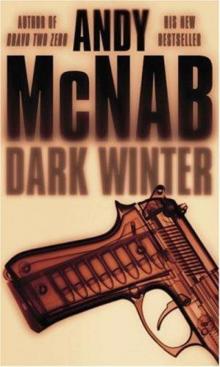 Dark Winter ns-6
Dark Winter ns-6 The Grey Man
The Grey Man Spoken from the Front
Spoken from the Front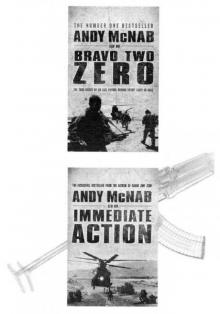 Meltdown
Meltdown Recoil
Recoil Nick Stone 1 - Remote Control.
Nick Stone 1 - Remote Control.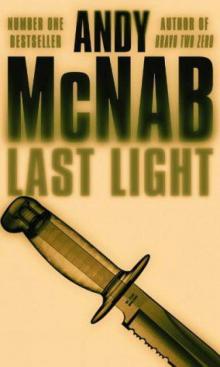 Last Light ns-4
Last Light ns-4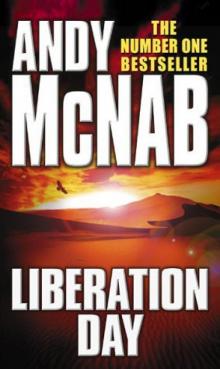 Liberation day
Liberation day Deep Black
Deep Black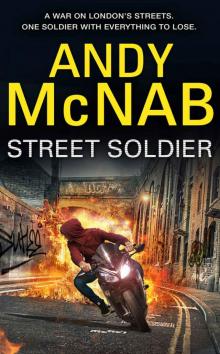 Street Soldier
Street Soldier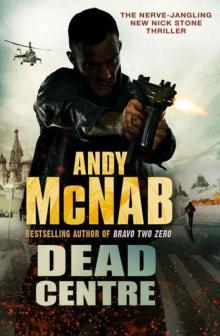 Dead Centre ns-14
Dead Centre ns-14 Exit wound ns-12
Exit wound ns-12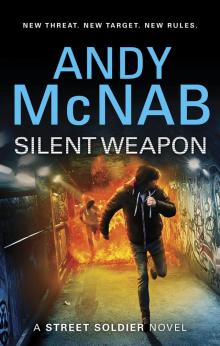 Silent Weapon
Silent Weapon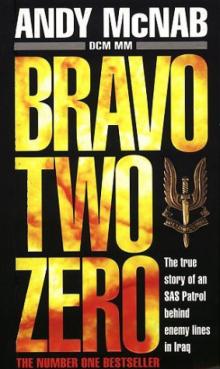 Bravo two zero
Bravo two zero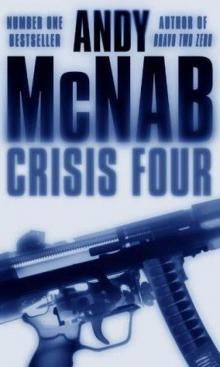 Crisis Four ns-2
Crisis Four ns-2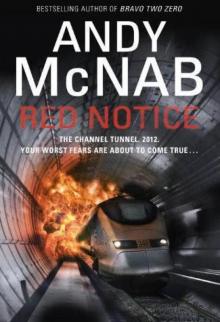 Red Notice
Red Notice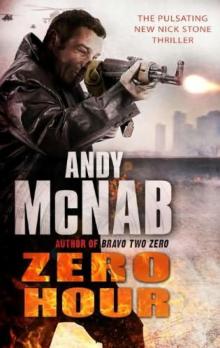 NS13 Zero Hour
NS13 Zero Hour Firewall
Firewall Last Light
Last Light Aggressor
Aggressor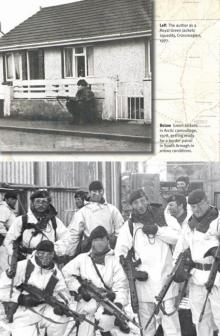 Seven Troop
Seven Troop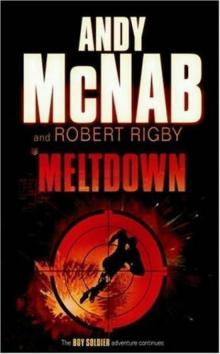 Meltdown bs-4
Meltdown bs-4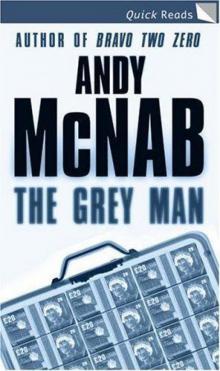 The Grey Man (quick reads)
The Grey Man (quick reads)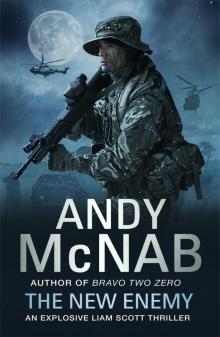 The New Enemy
The New Enemy Avenger
Avenger FireWall ns-3
FireWall ns-3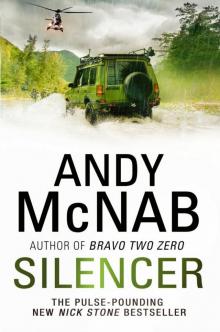 Silencer
Silencer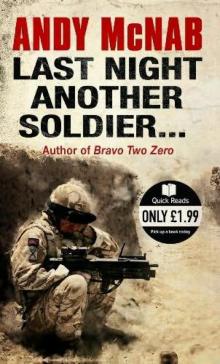 Last Night-Another Soldier…
Last Night-Another Soldier…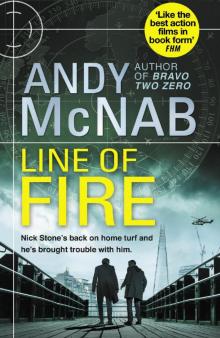 Line of Fire:
Line of Fire: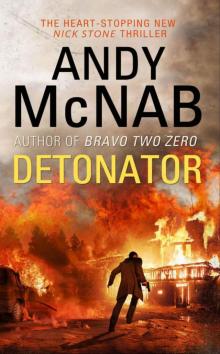 Detonator
Detonator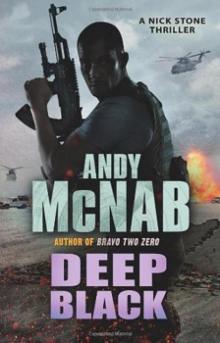 Deep Black ns-7
Deep Black ns-7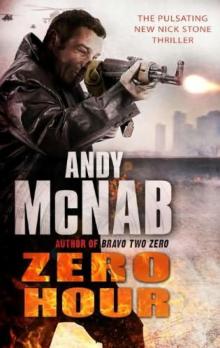 Zero Hour (2010) ns-13
Zero Hour (2010) ns-13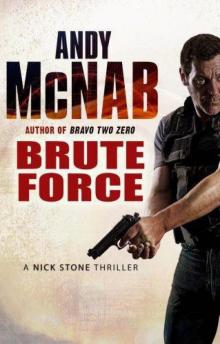 Brute Force ns-11
Brute Force ns-11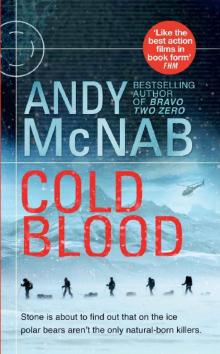 Cold Blood
Cold Blood Terminal Velocity
Terminal Velocity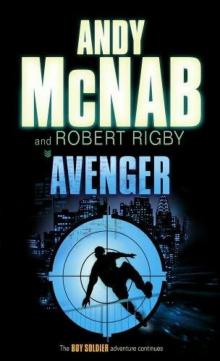 Avenger bs-3
Avenger bs-3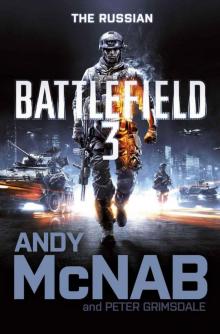 Battlefield 3: The Russian
Battlefield 3: The Russian DropZone
DropZone Zero Hour
Zero Hour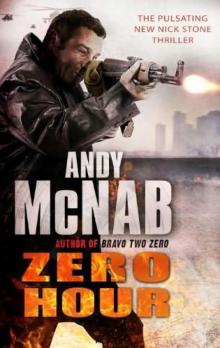 NS13 Zero Hour (2010)
NS13 Zero Hour (2010)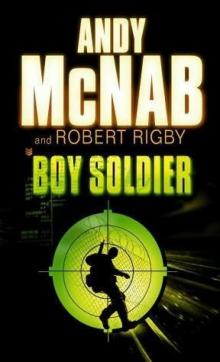 Boy soldier bs-1
Boy soldier bs-1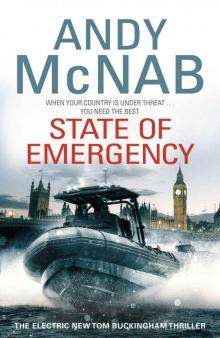 State Of Emergency: (Tom Buckingham Thriller 3)
State Of Emergency: (Tom Buckingham Thriller 3)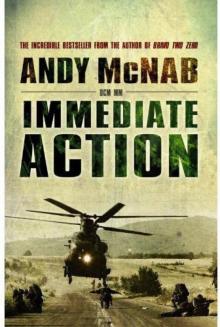 Immediate Action
Immediate Action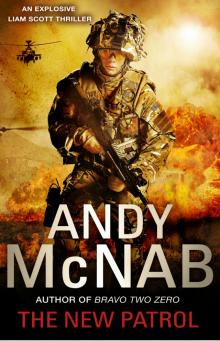 The New Patrol
The New Patrol Crisis Four
Crisis Four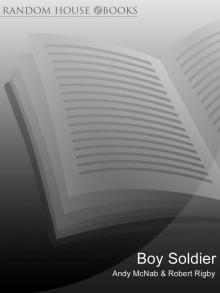 Boy Soldier
Boy Soldier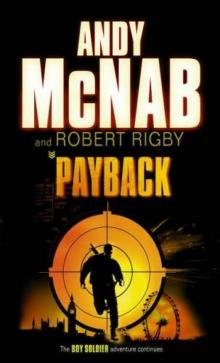 Payback bs-2
Payback bs-2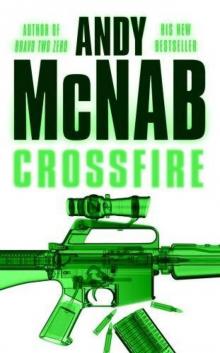 Crossfire ns-10
Crossfire ns-10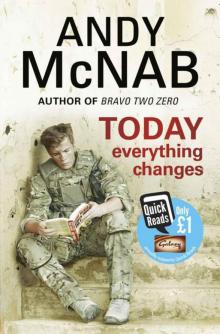 Today Everything Changes: Quick Read
Today Everything Changes: Quick Read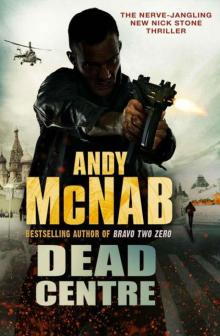 Dead Centre
Dead Centre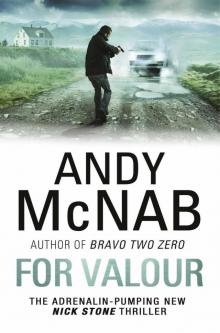 For Valour
For Valour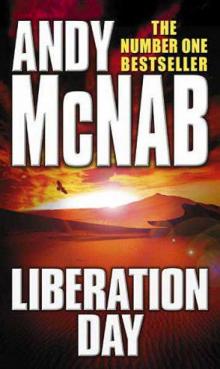 Liberation Day ns-5
Liberation Day ns-5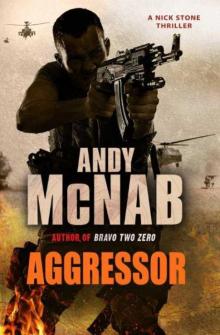 Aggressor ns-8
Aggressor ns-8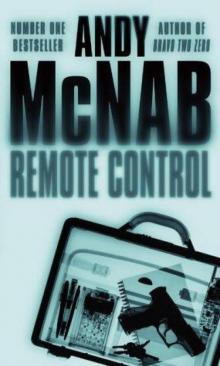 Remote Control ns-1
Remote Control ns-1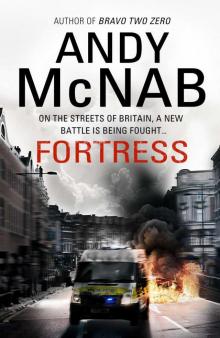 Fortress
Fortress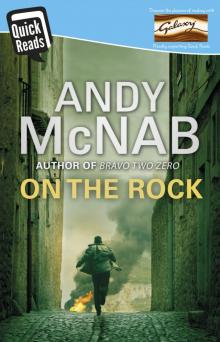 On the Rock
On the Rock Dark Winter
Dark Winter